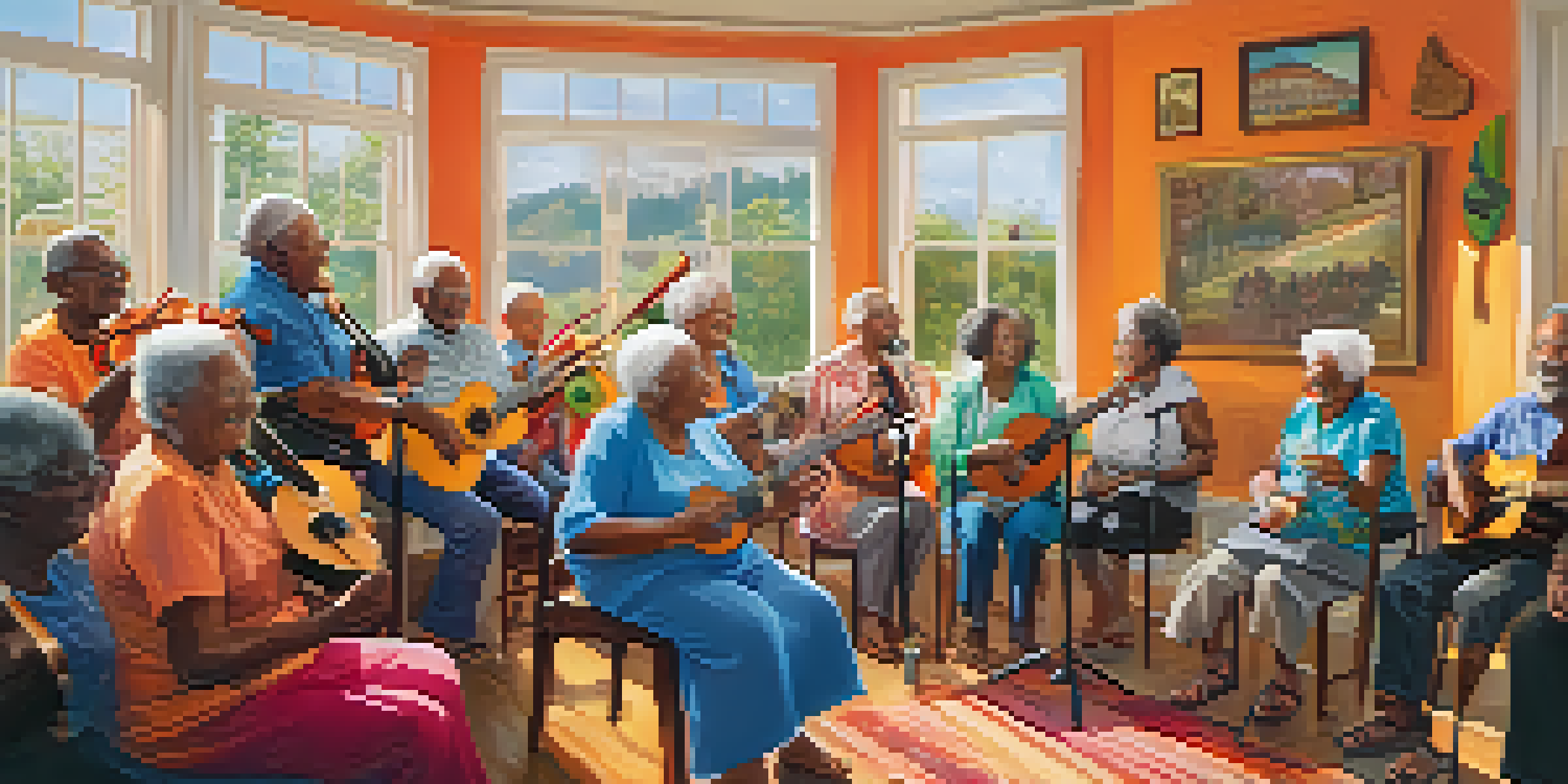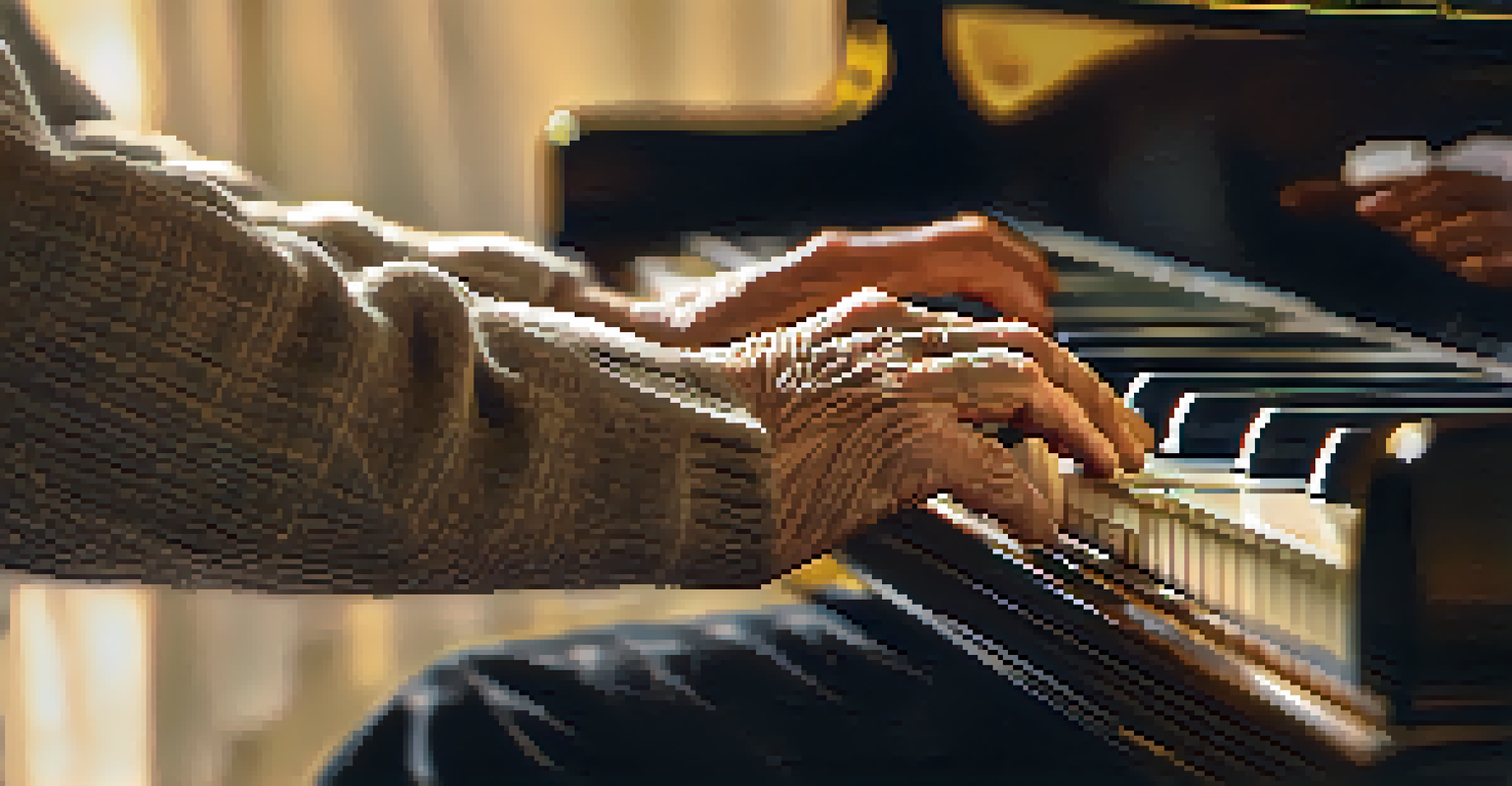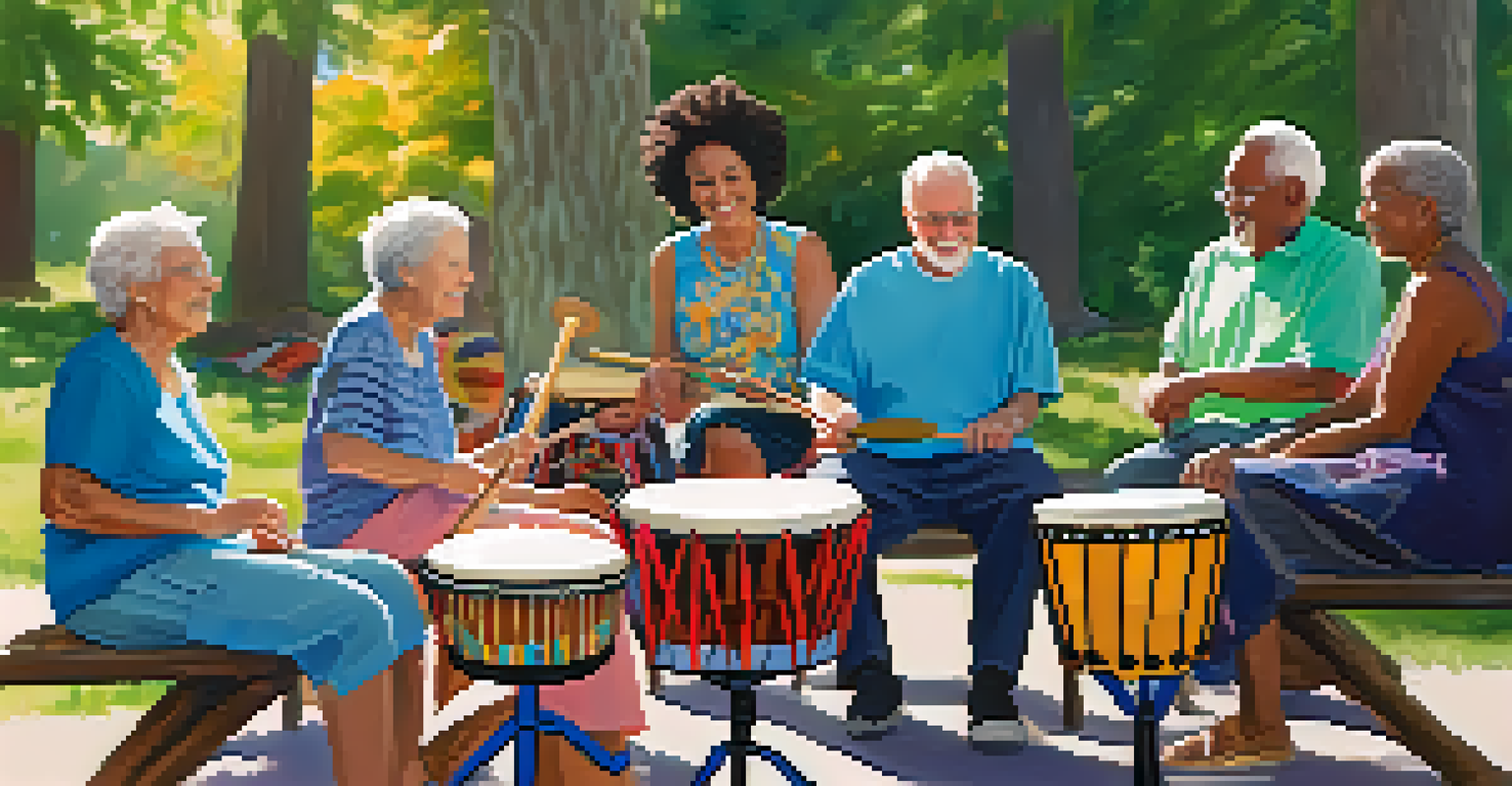The Benefits of Music Therapy: Healing Through Sound for Seniors

Understanding Music Therapy and Its Purpose
Music therapy is a clinical and evidence-based use of music interventions to accomplish individualized goals. It’s not just about listening to music; trained therapists tailor sessions to meet the emotional, cognitive, and social needs of their clients. For seniors, this approach can be particularly beneficial in addressing issues like memory loss or depression.
Music can change the world because it can change people.
During sessions, participants may engage in listening, singing, or even composing music. The versatility of music therapy allows it to be adapted to different needs, making it a powerful tool for enhancing the quality of life for seniors. By focusing on the unique preferences of individuals, therapists create a personalized experience that resonates deeply with each participant.
With a blend of structured activities and spontaneous musical expression, music therapy provides seniors a safe space to explore their emotions and memories. This can facilitate communication and connection, fostering a sense of community, which is vital for emotional well-being.
Enhancing Cognitive Function Through Music
One of the most impressive benefits of music therapy is its ability to enhance cognitive function. Research shows that music can stimulate brain activity, improving attention and memory, which are often areas of concern for seniors. Even those with conditions like Alzheimer’s may find that familiar tunes can spark memories and conversations.

For instance, a senior who struggles to recall names might suddenly remember a childhood friend when they hear a song from that era. This emotional connection to music can act as a trigger, making it easier to access stored memories. Such moments can be incredibly rewarding, both for the individual and their loved ones.
Music Therapy Enhances Cognitive Health
Engaging with music can significantly improve memory and attention in seniors, including those with dementia.
Moreover, music therapy can introduce cognitive challenges in a fun and engaging way. Through rhythm exercises or song recall games, therapists can stimulate different parts of the brain while keeping sessions enjoyable and light-hearted.
Emotional Healing and Stress Relief via Music
Music therapy offers a unique avenue for emotional healing, especially for seniors who may face loneliness or grief. The act of making or listening to music can evoke strong emotions, providing an outlet for feelings that might otherwise be difficult to express. This emotional release can lead to reduced anxiety and stress levels.
Where words fail, music speaks.
For example, a caregiver might notice a senior who typically appears withdrawn become more animated during a sing-along session. Music has a way of breaking down barriers and encouraging emotional expression, creating an atmosphere of comfort and understanding.
Additionally, engaging in music therapy can foster a sense of joy and fulfillment. The act of creating music together can strengthen bonds, not only with therapists but also with peers, creating a supportive community that contributes to overall emotional health.
Physical Benefits of Music Therapy for Seniors
Though it may not seem obvious, music therapy can also have physical benefits. Engaging in musical activities often involves movement, whether it's tapping feet to a beat or swaying to a melody. These movements can help improve coordination, balance, and overall physical health.
Moreover, music can be used as a motivational tool for physical exercises. For example, playing upbeat music during a light workout can encourage seniors to engage more actively and enjoyably. This makes the experience feel less like a chore and more like a fun activity.
Emotional Wellness Through Music
Music therapy provides a powerful outlet for emotional expression, reducing anxiety and fostering connections among seniors.
In essence, music therapy can effectively bridge the gap between physical activity and enjoyment, promoting a healthier lifestyle for seniors while keeping them engaged and motivated.
Social Connection Through Group Music Activities
Participating in group music therapy sessions can significantly enhance social connections among seniors. These group settings provide opportunities for shared experiences, encouraging interactions and bonding over music. This social aspect is critical for seniors, as isolation can negatively impact mental health.
For instance, a drumming circle can foster teamwork and camaraderie, as participants create rhythms together. The shared joy of making music can lead to laughter, conversation, and newfound friendships, all of which contribute to a sense of belonging.
Furthermore, these group activities often promote inclusivity, allowing individuals of varying abilities to participate. This environment respects everyone’s contributions, reinforcing a sense of community and support among participants.
Personalized Approaches to Music Therapy
One of the most significant advantages of music therapy is its capacity for personalization. Each senior has unique musical preferences and life experiences, and therapists can tap into these to create meaningful sessions. This tailored approach ensures that therapy resonates with each individual, making it more effective.
For instance, if a senior has a fondness for jazz, a therapist might incorporate jazz tunes into their sessions, using familiar rhythms to facilitate engagement. This not only fosters connection but also makes the therapeutic experience more enjoyable and relevant.
Personalized Music Therapy Approaches
Tailoring music therapy sessions to individual preferences enhances engagement and effectiveness for seniors.
By understanding the personal history and preferences of each participant, music therapists can create a more impactful experience. This personalization not only enhances the therapeutic process but also affirms the individual’s identity and life story.
Addressing the Needs of Seniors with Dementia
Music therapy has shown exceptional promise in supporting seniors with dementia. Familiar songs can evoke memories and emotions, often providing a sense of comfort and recognition. This can be particularly valuable for individuals who struggle with memory loss, offering a bridge to their past.
For example, a senior with dementia may light up when they hear a song from their wedding day, even if they can’t recall specific details about their life. These moments of recognition can be incredibly powerful, both for the individual and their caregivers, fostering deeper connections.

Moreover, music therapy can help manage behavioral symptoms associated with dementia, such as agitation or anxiety. Engaging with music can soothe and calm, providing an effective strategy for improving quality of life.
The Future of Music Therapy for Seniors
As awareness of the benefits of music therapy continues to grow, its role in senior care is becoming increasingly recognized. More facilities are incorporating music therapy programs into their offerings, reflecting a shift toward holistic approaches to health and well-being. This trend is promising for the future of senior care.
Moreover, ongoing research into the effects of music therapy will undoubtedly enhance our understanding of its benefits. As we learn more about how music impacts the brain and body, we may discover even more applications for seniors, tailoring approaches to meet diverse needs.
Ultimately, the future of music therapy for seniors looks bright. With continued support and innovation in this field, music can remain a vital source of healing, connection, and joy for our aging population.